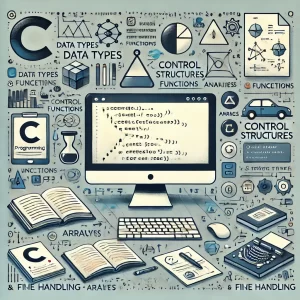C Language Course
Introduction to Compiling and Software Development of C Language:
- Basic scalar data types, operators, flow control, streamed input/output, conversions
- Declaring, defining, and invoking functions
- String processing, exception handling, and dealing with namespaces
- Object-oriented approach and its vocabulary
- Dealing with classes and objects
- Defining overloaded operators
- Introduction to STL (Standard Template Library)
The best training for C language in this institute is TechFly Jodhpur.

Chapters
C Language Basics
- machine and high-level programming languages, compilation process
- obtaining the machine code: compilation process
- recommended readings
- your first program
- Variable—why?
- integers: values, literals, operators
- characters: values, literals, operators
- dealing with streams and basic input/output operations
Flow control & data types
- How do we control the flow of the program?
- floating point types: values, literals, operators
- more integral types: values and literals
- loops and controlling the loop execution
- logic, bitwise, and arithmetic operators
Functions
- Functions: why do you need them?
- declaring and invoking functions
- side effects
- different methods of passing parameters and their purpose
- default parameters
- inline functions
- overloaded functions
Accessing data and dealing with exceptions
- converting values of different types
- strings: declarations, initializations, assignments
- string as the example of an object: introducing methods and properties
- namespaces: using and declaring
- exception handling
Fundamentals of the object-oriented approach
- Class: What does it mean?
- Where do the objects come from?
- class components
- constructors
- referring to objects
- static members
- classes and their friends
- defining and overloading operators
Class hierarchy
- base class, superclass, subclass
- Inheritance: how does it work?
- types of inheritance
- inheriting different class components
- multiple inheritance
Classes—continued
- polymorphism: the notion and the purpose
- virtual methods: declaring and using
- inheriting virtual methods
- abstraction and abstract classes
Exceptions—dealing with expected and unexpected problems
- What is an exception?
- catching and throwing exceptions
- different courses and hierarchy of exceptions
- defining your exceptions

The output is:Master C Programming at the Best Computer Institute for C Language in Jodhpur
Are you looking to learn C programming from the best? Look no further than TechFly, widely recognized as the best computer institute for the C language in Jodhpur. Our specialized courses in C programming offer an in-depth, hands-on learning experience designed to take you from beginner to advanced levels. With experienced instructors, interactive sessions, and practical applications, we ensure that you gain comprehensive knowledge of the C language.
Why Choose TechFly, the Best Computer Institute for C Language in Jodhpur?
- Expert Faculty: Our trainers are seasoned professionals with years of experience in C programming, committed to providing quality education.
- Structured C Programming Curriculum: From basic syntax to advanced concepts like pointers, memory management, and data structures, our curriculum is tailored to help students master C programming step-by-step.
- State-of-the-Art Facilities: Learn in a fully equipped environment with the latest technology and tools to practice C programming efficiently.
- Real-World Projects: Get hands-on experience by working on C programming projects and simulating real-world applications. Our practical approach ensures that students are ready for industry challenges.
- Affordable Fees and Flexible Timings: As the best computer institute for C language in Jodhpur, we provide affordable courses with flexible timings, so you can balance learning with your other commitments.
C Language Course Highlights at TechFly
- Introduction to C Language: Understand the core concepts such as variables, data types, operators, and control statements.
- Advanced C Topics: Dive into complex topics like functions, arrays, structures, and pointers.
- Project-Based Learning: Gain practical experience through real-world C programming projects.
- Placement Assistance: We help you connect with top companies in Jodhpur by preparing you for interviews and assessments.
Why Learn C Programming?
Learning C programming opens the door to a variety of opportunities in fields like software development, embedded systems, and operating system design. It forms the foundation for many other programming languages, making it a must-learn for aspiring developers.
TechFly’s C programming course is designed to ensure that students not only grasp theoretical concepts but also develop practical skills that are in demand in today’s job market. Whether you want to build desktop applications, work on operating systems, or develop embedded systems, our comprehensive course will equip you with the knowledge and confidence you need.
Join TechFly Today—the Best Computer Institute for C Language in Jodhpur
If you are serious about learning the C language and want to join the best computer institute for the C language in Jodhpur, TechFly is the perfect place for you. Get expert guidance, practice programming skills, and start your journey toward becoming a proficient C programmer.
Visit us today to learn more about our C programming course offerings and enrollment details. We look forward to helping you achieve your programming goals.
